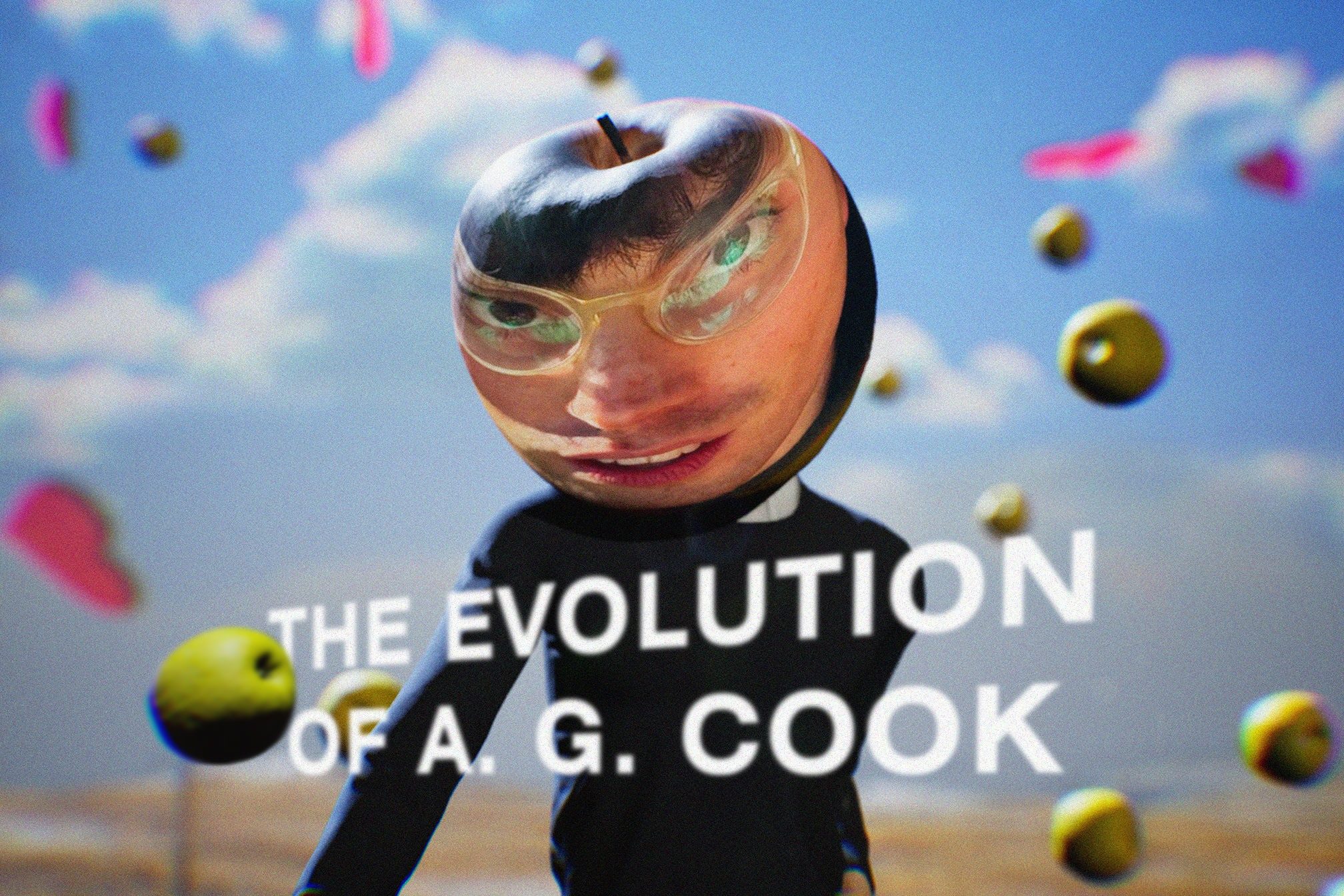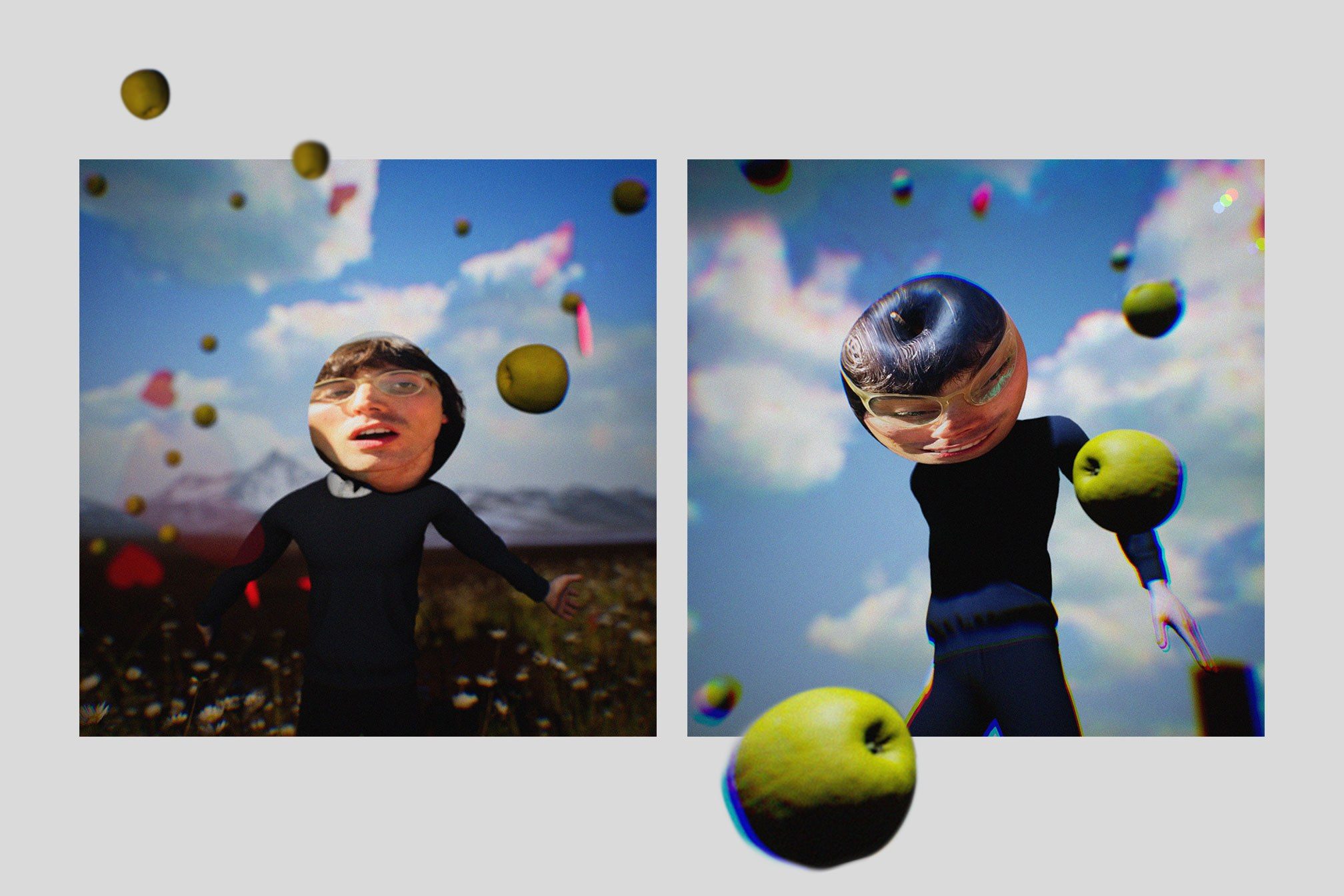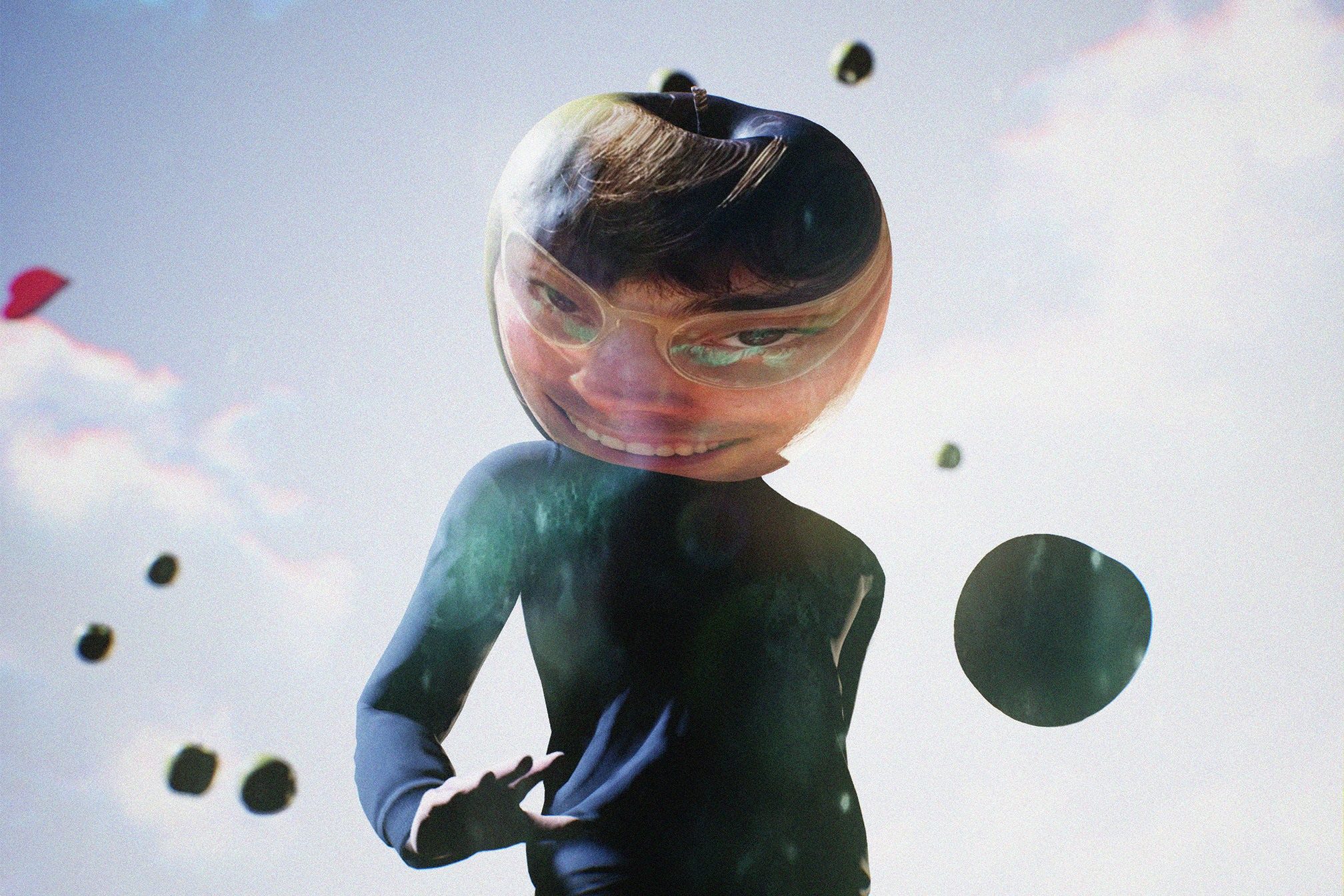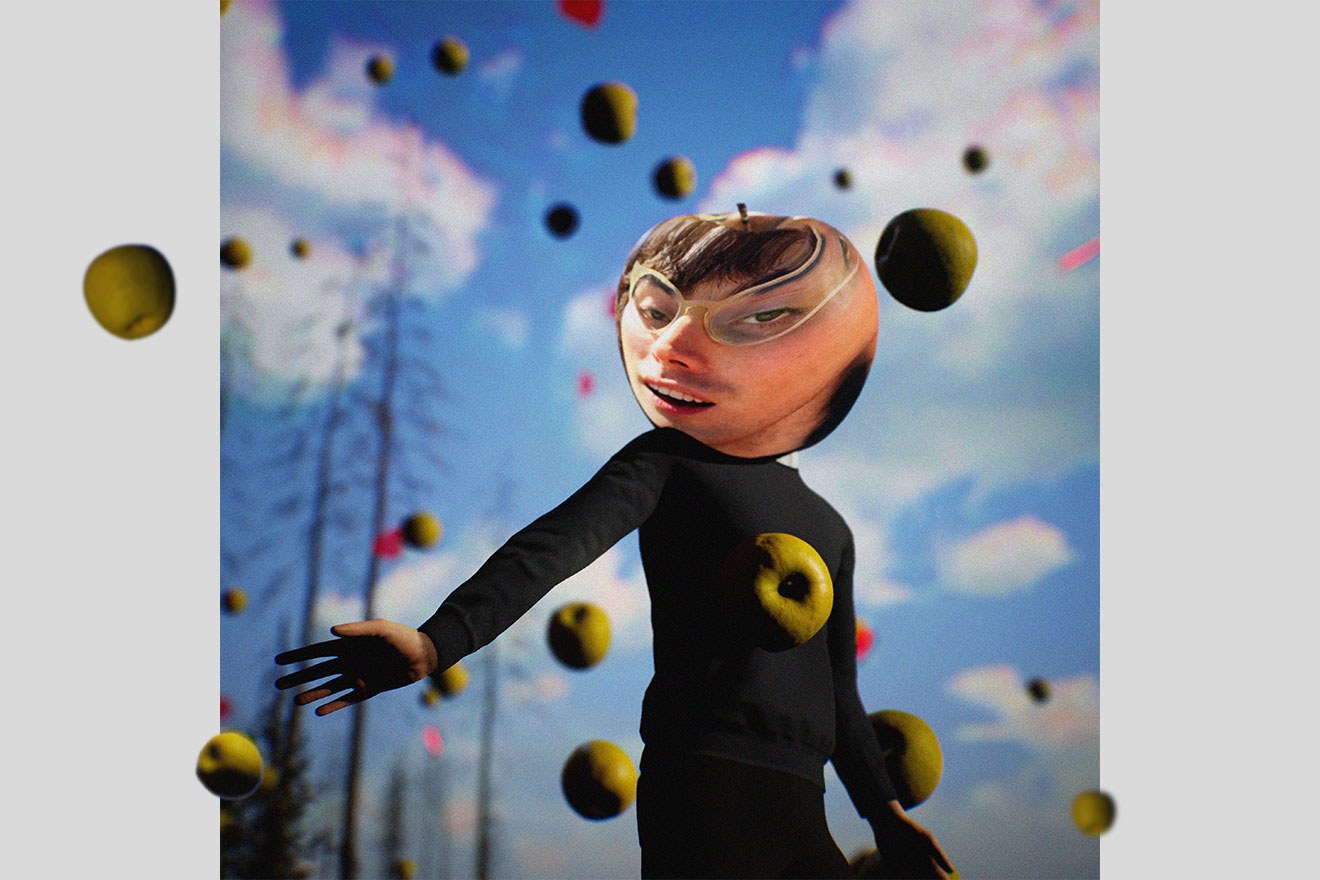 Artists
Artists
The evolution of A. G. Cook
After breaking through as a 'disruptor', the PC Music founder is now a scene figurehead and experimental pop pioneer. This summer he's further embracing the limelight with the release of two 'debut albums'
“It took me a while to figure out what I thought a good A. G. Cook album would be. But I realised that, if I do really believe in PC Music and see it as Personal Computer Music, I should make my own thing - otherwise it’s a bit of a hypocrisy,” says Alexander Guy Cook. Seven years since his divisive yet future-facing PC Music collective broke through the online realm and into the IRL world, the 30-year-old - who has since worked with pop outsiders Charli XCX, Caroline Polachek and Jónsi of Sigur Rós - is finally ready for his time in the spotlight.
Speaking to Mixmag over a glitchy Zoom call from Montana - where he spent lockdown with his girlfriend and “feels like a funny alien” because of his Britishness - the smiling and deep-thinking artist is just over a week away from releasing his 10-track “second debut album”. ‘Apple’ comes exactly five weeks after the 49-track ‘7G’, which featured original tracks and covers of indie, pop and rock artists split across seven themed discs: ‘Drums’, ‘Guitar’, ‘Supersaw’, ‘Piano’, ‘Nord’, ‘Spoken Word’ and ‘Extreme Vocals’. Alex said the format was his way of “organising things, fleshing out and conceptualising a lot of different material”.
Considering the “technically immense” nature of it all, he’s been pleasantly surprised by the reaction. “It would have been impossible for me to make a 49-track album with no structure, as much as I love those Autechre NTS session ones,” he jokes, beaming from under his circular-framed glasses. “Breaking it down into these micro-tasks and ideas made it musically possible for me, right down to the mixing of each disc. I would have been completely directionless otherwise.”
And while the self-described “introverted hermit” knew it would be “a crazy troll move” to follow it up with his ‘second debut album’, he says “it was always going to be a lot of stuff this summer. But maybe it’s become a lot a lot”. The choice of album titles also inspires multiple interpretations – trolling and otherwise. It’s been seven years since starting PC Music, ‘g’ is the seventh letter in the alphabet, and then there’s the 5G controversy; while an album called ‘Apple’ from the PC Music founder reads like a nod to tech brands.
“Once you start playing with those associations, it spirals out of control pretty fast. I wanted to condense it more and more,” he says. With the “grandiose yet silly” choice of ‘Apple’, the “machine vs nature references are never-ending; it’s the ultimate object, my first word level, but it also has connotations to tech companies, The Beatles’ record label, Snow White, all the biblical stuff... it’s a portal into everything.”

He was also interested in how brands were using ‘apple’ in a similar way, “as this simple seductive still life object that contains knowledge. I really do like the polar extremes,” he says, revealing how the word helped fuel the concept, right down to the promotion. Influenced by the classic pop music rollout being “this never-ending thing”, with ‘Apple’ he was looking for simple words that could reflect an era, like Rihanna with ‘Loud’ and Lady Gaga and ‘ARTPOP.
Sonically, Alex arrived at a “really intentional palette of sounds - contrasting intense electronic and natural moments”. He describes 2016 single ‘Superstar’ as giving him the confidence to focus on his own voice and the singer-songwriter side of his music. “It was a big jump forward,” he says. “I was playing around with being the singing producer, and the Elton John-ness of it all; the way I use my vocal, going from being slightly stumbling to really confident”.
And, by using instruments that had a “strong identity”, he thought it would be a good way of communicating the difference between songwriting and sound design and “bending those perspectives; how if you’re singing over acoustic guitar that’s somehow a particular type of song. I was really into exploiting the messaging of all those instruments.” Incidentally, it’s resulted in some of his most human and affecting work to date, especially on relatively stripped-back ‘Apple’ highlights ‘Haunted', ‘The Darkness’ and 'Beautiful Superstar’, which balance his love for indie, pop, classical and experimental music.
As an “intense aggressive listener of music”, covering songs he loves for ‘7G’ - varying from Taylor Swift to Blur to Sia and beyond - made total sense, even if fans could never have imagined the result. “I love the original ‘Chandelier’, it’s so ridiculous,” Alex enthuses, meticulously dissecting each detail. “That metaphor of her scream-singing and the way the chorus drops. It was already so maxed out, so I thought to make the drop even bigger I could have the key drop as the vocal comes in and have someone like me singing - who is not as good as Sia - just aiming for the ceiling or the sky.”
This sort of humble ambition has come to characterise the entire PC Music story. Having made its website a week after graduating from university, Alex remembers that things blew up incredibly quickly in 2013. “I was shocked by the initial speed of it all. I was expecting a bit more of a slog and obscurity,” he says. “I’d had the idea for a while but was burnt out from studying, so I built it as a way to test these ideas in the real world.” As someone who has always seen music as “fluid and abstract”, it’s no shock to learn that he’s “never been drawn to mixes where it’s all at the same BPM with smooth transitions”. Quietly confident, Alex felt that “if it had more of a collective feel, with strong visuals and personality, it would naturally communicate better”.
Read this next: Let's get physical: How independent artists are reinventing the physical release format
Months later, artists like Éclair Fifi would start playing PC tracks on radio while a partnership with Columbia Records followed in 2015. But the real turning point came when A. G. went to LA for writing sessions and ‘Pink and Blue’ - a collaboration with Hannah Diamond – was being passed around. “Within that bubble, it was a mainstream reference,” he remembers.
However, it wasn’t all positive. Alex and his friends faced a torrent of dismissive criticism (including whether Hannah Diamond was a real person). “I didn’t expect all of that,” Alex reflects, “but I was very happy to live with that media reaction.” Retrospectively, he says it was “pretty funny having all these articles and interviews where you’d first have to get over the hump of ‘is it a parody or not?’, especially because my only experience of making music before was a handful of friends doing these funny DJ sets.
“Our friends would be like ‘that was cool but why was it cheesy?’ or ‘I like this but it’s such a guilty pleasure’,” he says. And, although Alex understands the initial ‘disruptor’ status that he and the collective were tagged with in their early SoundCloud days, he thinks it was more about being “accelerationist, forging towards the inevitable, evolving with what’s going on and not limiting it to any one technology or format”.

Most importantly, though, he cites “being honest and transparent” as the label’s core ethos, recalling the label’s Pop Cube event in New York with Red Bull: “Most people would do those but not try to brand it as a Red Bull thing. Whereas with our event, it was like ‘let’s bring in more energy drinks; I’m gonna wear the motocross outfit they’ve designed; we’ll have our own energy drink. Actually, QT is the only energy drink brand to ever share a stage with Red Bull because it’s against their guidelines, and we had to convince them that we weren’t taking the piss completely.” Alex says this culmination of self-aware commercialism was his and PC Music’s way of “letting people see things as they are, and being like ‘this is where we’re at with music promotion now”.
But most importantly, he thinks the label’s eventual commercial success has been down to “the sheer force of so many talented individual artists and producers. Eventually, it takes over,” he says.
While the releases were “organised in a really loose way”, Alex thinks that everything being so “surprisingly well-presented" helped people to connect. “It had confidence in the collective and it being a movement; not shying away or being too worried about getting labelled as pretentious. I think it really helps in this bizarre technological music industry world to fight for those things more.” Ultimately, though, he says PC Music is about “the attitude of freedom - from different judgements or expectations; how something can be really heavy but light and fun at the same time, and not worrying about guilty pleasures”.
Read this next: Post-PC Music: How the London label inspired a new stage in the pop continuum
Over the last few years, PC Music sounds and styles have been increasingly infiltrating the mainstream: from label affiliate SOPHIE collaborating with Madonna, her single ‘Lemonde’ soundtracking a McDonald’s advert and Danny L Harle teaming up with Carly Rae Jepsen to the more recent explosion of 100 gecs, ‘hyperpop’ and the post-PC Music generation. Understandably, Alex sees it as a “victory - for the collective to get to a point where it’s understood”. He’s quick to downplay his impact, though, describing it as a continuum, with influences including Hudson Mohawke, Rustie, Uffie and Ed Banger going back to Gorillaz, Daft Punk and even Kraftwerk, referencing “how unbelievably mainstream and high concept genre-destroying that stuff was. There’s been plenty of things that we’ve also evolved from.”

He channeled a future-facing ethos with recent virtual festival Appleville, a fundraising event that aimed to “emulate that feeling of when you’re at a live gig”. While the line-up was massive (100 Gecs, Hannah Diamond, Charli XCX, Amnesia Scanner, Clairo, Jimmy Edgar) he wanted to round-up artists who he thought would have “very different, contrasting takes on what I thought could be ‘live’ computer online sets. In fact, all of those artists had previously played with online culture.”
Having been a regular fixture at online events during lockdown - including at Club Quarantine, 100 gecs’ and Open Pit’s Minecraft festival Square Garden and Porter Robinson’s Secret Sky festival - Alex really believes in the “hybrid potential” of the virtual world. “As the pandemic was growing, I was only ever going to do a handful of live things and was already planning more digital-based experiences, because I felt that suited the music,” he says. “The Secret Sky performance, particularly, summed something up for me about how I could present what I was doing as fabricated and authentic at the same time.” On a wider scale, he says it’s providing intimate access for fans and artists despite isolation: “lots of people can’t get to a cool show in a major city anyway, or what if there’s a country you can’t get to but want to do something special for?”.
Read this next: "Coronavirus will never stop the rave": How people are finding new ways to party online
Proceeds from Appleville went to UK-based charities Mermaids and Black Cultural Archives, two organisations that Alex says are “really lifting up underrepresented voices”. He chose them after reflecting on his childhood, recalling “gaps in teaching” in terms of Black and trans history: “I’ve been more and more aware of that and how big a part it could have played in people’s upbringings culturally.” Though he recognises that fundraising is a “very basic level of it”, Alex thinks what’s equally powerful is that virtual events are enabling a whole group to “be aware of a certain issue. It feels like a very intentional moment, which is a much stronger reality than the strolling pseudo-celebrity angle that you can get absorbed into on social media”.
In a more general sense, he says it’s been “horrific” to see so many things “scapegoated” over the past few months as a result of the pandemic, citing “negativity towards immigration or other countries” as specific examples. “It’s been quite alarming to see so many people just content with staying in their zone,” he says.
He does, however, think the pandemic has broadened the way people approach new sounds. “More people are ready for music that intrigues them a bit more, because they have more spare time.” As for the future, he thinks there’ll “definitely be evolutions beyond that. I’m most interested in things that will disrupt PC Music and ‘hyperpop’ as much as we so-called 'disrupted pop culture'.” That’s reflected in the label’s most recent signings umru and Planet 1999, who, Alex says, “break the sound, or parts of it”. Moving forward as a label, he’s interested in “the mashed-up version that takes it to a different zone, collaborating with people who have a different perspective”. It's a time of global upheaval, but musically, A. G. Cook is showing his most assured form. He's ready for what comes next.
‘Apple’ is out now on PC Music, get it from Bandcamp
Ben Jolley is a freelance writer, follow him on Twitter
Actual Objects is an experimental creative studio, follow them on Instagram
Read this next: Get the best of Mixmag direct to your Facebook DMs



